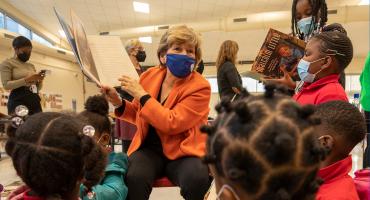Reading opens the world
Several years ago, I participated in a book giveaway in McDowell County, W.Va., one of the poorest counties in the U.S. I offered a book to a boy who immediately clutched it to his chest, grinned and said, “I’m going straight home to put this in my library.” I asked him what other books he had in his library. Bubbling with excitement, he said, “This is the first one!”
That encounter has stayed with me, because it shows that reading is as much about our hearts as our minds.
Reading is a foundational skill necessary for virtually everything we learn and do. Reading well is an essential pathway to opportunity.
Reading also allows us to travel to the past and the future, to visit real and imagined places, and to meet animals who talk, heroes who inspire us, villains we love to hate and characters who make us laugh out loud. Anyone who has ever begged to read “just one more chapter,” or been left yearning for more at the end of a book, knows that reading is more than a tool; reading transforms us.
After two years of disruptions to lives and learning during the pandemic, a concerted focus on reading is needed to help young people not just to catch up but also to thrive. That is why this month, the American Federation of Teachers launched a multiyear literacy campaign called Reading Opens the World, designed to support students, educators and families.
The goals of the campaign are to:
- Give children and young people 1 million free books to read, love, keep and open their world;
- Give teachers and school staff high-quality tools and professional development that translate the science of reading into usable resources to help students read—and read well;
- Give parents and caregivers fun and research-based tips and tools to support literacy; and
- Build on and forge new connections among families, communities, educators and schools to be partners in students’ literacy.
The AFT is partnering on this initiative with First Book—together, we have given out more than 7 million books over the past decade—and with the AFL-CIO. We are buying 1 million books, and our bookmobile will travel the country in 2022 distributing them—especially in rural, urban and low-income areas. Our members are dedicating at least $2 million to this literacy effort.
In recent AFT polling, one-third of teachers say that in a typical year, more than half of their students start the year below grade level in reading. Among teachers who provide reading instruction, only 44 percent feel “fairly” or “very” well- prepared to teach reading to struggling and below-grade-level readers in their classes.
Louisa C. Moats, a reading expert and author of Teaching Reading Is Rocket Science, notes that, “Because reading affects all other academic achievement and is associated with social, emotional, economic and physical health, it has been the most researched aspect of human behavior.” The scientific community has achieved broad consensus regarding what we know about boosting reading achievement. Yet much of this research is not included in teacher preparation programs, widely used curricula or professional development.
The AFT offers top-notch professional development for teachers who want to train other teachers in high-quality reading instruction. But a 40-hour in-person course can reach only so many. We want professional learning this good to be free, accessible and available on demand to thousands more educators. So, we are developing a 10-hour online course where any member can learn about research-based, high-leverage instructional practices for supporting literacy.
Reading and literacy resources also are available on Share My Lesson, AFT’s online platform for teaching tools. Next month, we will kick off a series of webinars that translate the science of reading into teaching practices educators can use.
We chose the holiday season to begin this campaign to spread joy after nearly two years of trauma and loss, and to forge connections among the educators, families and caregivers who are partners helping kids prepare for their future.
We launched Reading Opens the World with a joyous celebration for students, staff and parents at Malcolm X Elementary School in Washington, D.C. There have been similar events in 25 other communities in New Hampshire, Ohio, Oregon, Puerto Rico and elsewhere—and we’re just getting started.
We’ll keep fighting for lower class size, wraparound services and the social, emotional and academic supports kids need. But I know we’re onto something every time I participate in a read-aloud or book giveaway. I smile at the thought of children across the country going home, putting these books in their “libraries” and asking to read “just one more chapter” of a book that will open their world one page at a time.

